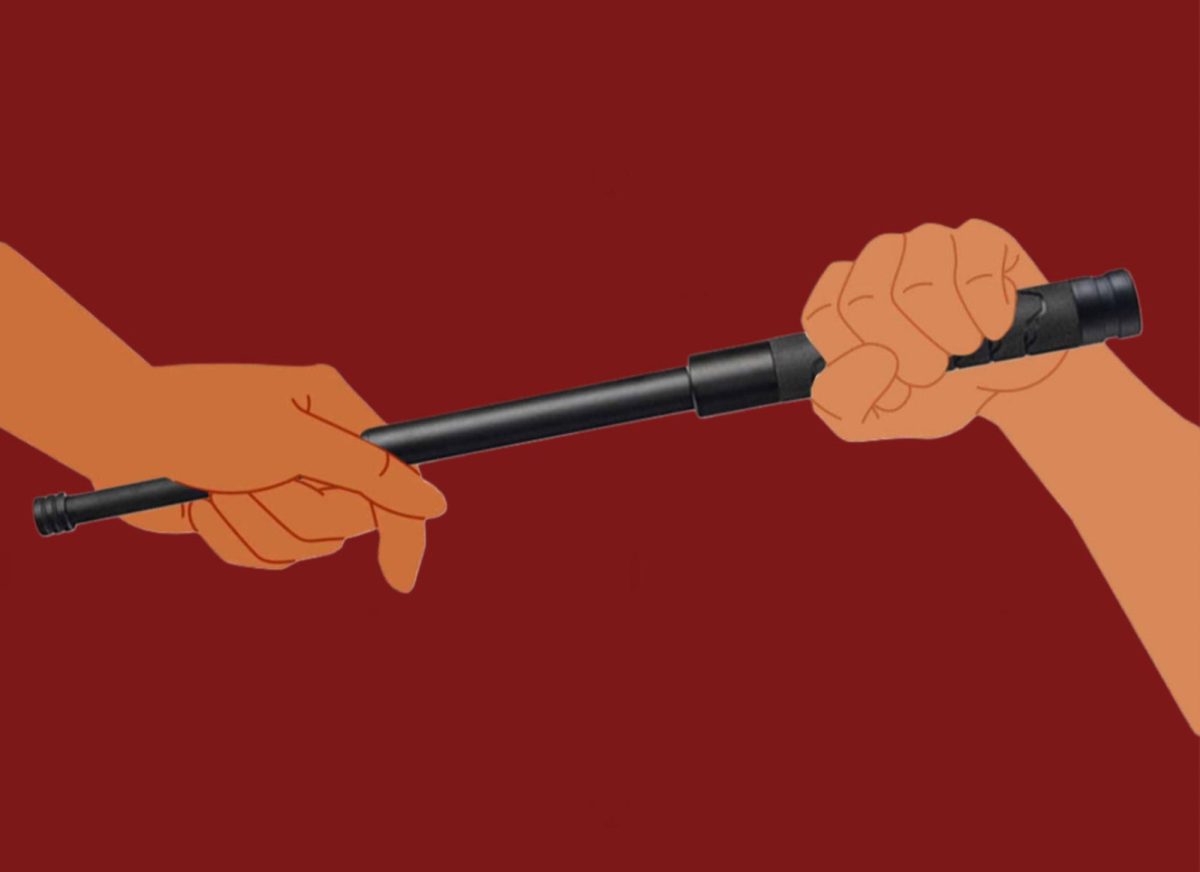At around 6:13 a.m. on Oct. 13, 2023, Fullerton College campus safety officer EJ Herrera approached three men on the campus quad who appeared “under medical distress.” Almost immediately, they began attacking him.
He was stomped on and kicked, his eyes were gouged, and the attackers even swung a tomahawk-style ax at him and other officers who approached to help.
“One of them said ‘let’s kill him,’” Herrera recalled in an interview with The Hornet. “In the eyes of the law, that’s [a] specific intent to commit murder.”
Herrera recounted this harrowing experience at a Faculty Senate meeting on Oct. 17, 2024, where members of Faculty Senate visited the idea of adjusting BP/AP 7600 – board policies that govern campus safety officers at Fullerton College, Cypress College and North Orange Continuing Education and their ability to carry certain self-defense tools.
Fullerton College Director of Campus Safety Steve Selby is advocating for officers to be allowed to carry an ASP, a concealed baton that can be extended with the flick of a wrist. Supporters argue that officers need additional self-defense. Opponents of the ASP say that campus safety officers are not the police and may feel obligated to use the baton in situations that could put them and others at risk.
Under the current policy, officers can only use pepper spray. However, Herrera said he is allergic to certain components of the pepper spray he had carried on him.
Backup eventually arrived after other safety officers could hear Herrera struggling through his walkie-talkie, and the suspects were detained. Herrera could not walk away the same, though—in just six minutes his attackers left him with a severe concussion, scratched cornea, and injuries to his head, neck and back. He was in and out of the hospital and off work for six months.
“I don’t sleep at night,” said Herrera, when discussing his physical health after the incident. “I’m waking up at the same time [every morning], at three o’clock in the morning from either a headache or severe neck pain, shoulder pain, and my fingers go numb sometimes.”
The North Orange County Community College District has been working on a revision of its Campus Safety policy since 2019. An outside consulting group was brought on in 2021 to draft a revision.
The district asked for feedback on the revised policy from the three campuses in 2024 through the shared governance process, in which representatives from students, faculty and staff can all weigh in.
In an Aug. 15, 2024, document, a district committee summarized the changes to the policy as follows: “Changes included adding definitions explaining community-oriented safety philosophy and outlining the general authority and role of Campus Safety Officers, including providing guidance on use of force, conducting searches, engaging in pursuits, authorization regarding traffic and parking violations, equipment, patrolling, and training.”
In January 2023, the California Community College Board of Governors put into effect new regulations regarding public safety on community college campuses. These include focusing on community policing principles, considering officers “guardians” vs. “warriors,” and establishing public safety advisory boards.
The current revision of the NOCE board policy on Campus Safety does not include a provision that allows officers to carry any weapons, such as TASERs, batons or ASPs. Still, student, faculty and classified senates have been considering their stance on the ASP, since that could be added into the policy as it goes through further revisions.
Classified Senate, which represents all other employees besides faculty at Fullerton College —including campus safety officers— declined to take a stance on the ASP. Kesha Shadwick, the president of Classified Senate, said in a statement to the Hornet that effective training and prioritization of de-escalation tactics is critical for their support.
“The current initiative requires significant revision to ensure it aligns with the values and priorities of our campus community,” said Shadwick. “Currently, the Senate strongly advocates revising the policy from the ground up to create a framework that prioritizes transparency, effective de-escalation, and accountability.”
Faculty Senate ultimately voted on Nov. 7 that they did not support allowing campus safety officers to carry ASPs.
Those opposed said that the presence of ASPs could potentially escalate dangerous situations and could change the perception of safety officers as non-threatening. They also raised concerns that the 8-hour training required to use an ASP is inadequate.
According to Selby, the one-day training covers legal and moral responsibility, how to use an ASP for defensive measures, striking and non-striking areas for the ASP, first aid for anyone injured, and fundamentals of a baton.
“I don’t think that we should be putting our campus safety officers in harm’s way. Instead, we [should] be focusing on deterrence, presence, reporting, observation… keeping them as facilitators,” said political science professor Archie Delshad at a Faculty Senate meeting on Oct. 3.
Emily Kim, president of Associated Students, and Eeman Adam, president of the Inter-Club Council, produced a 40-page report that reviewed the benefits and drawbacks of supplying safety officers with batons.
The report states that after weeks of research and discussion, Associated Students does not support the proposal to arm campus safety officers with batons.
They claim their decision was based on considerably low crime reports on the Fullerton College Clery Annual Security Report, which show two aggravated assault incidents from the years 2021-2023, as well as potential conflict escalation in the presence of batons and the heightened financial and reputational risks. Their report says potential misuse of batons can lead to expensive lawsuits, taking funds away from education programs and damaging the college’s reputation
“We believe that funds for batons would be better directed toward expanding mental health resources, providing non-lethal response training for campus officers, and exploring alternative protective tools,” the report states.
Selby claims that the Clery Report does not take into account crimes that are prevented by campus safety officers, as well as crimes that never get reported to campus safety at all.
In a statement to The Hornet, he pointed to the NOCCCD Workplace Violence Policy, which instructs employees to call Campus Safety and/or 911 in an emergency that involves an imminent risk of harm to self or others.
“The policy directs everyone to call Campus Safety to deal with a violent situation. However, they have no safety equipment to keep themselves or others safe,” said Selby, who worked for the Los Angeles Sheriff’s Department before leading the Campus Safety department for the past 15 years. “Virtually every college in California has officers carrying an ASP for safety reasons. It’s time that the district approves a piece of safety equipment for our officers.”
The district workplace violence policy also states that in escalated situations where “there are concerns for active violence with intent to harm (e.g. knives, guns, explosive devices, etc.),” Campus Safety will call law enforcement.
Administration of Justice professor Kelly Robertson echoed the need for more defensive tools on campus.“Next door at Fullerton High School, they have an armed police officer from Fullerton PD. [At] Cal State Fullerton, they have their own armed police department,” she said in an interview with The Hornet. “‘Armed’ meaning they have mace, they have an ASP or baton, they have TASERs, they have guns, and our poor campus safety officers are left without any defensive tactical tool.”
NOCCCD Chancellor Byron Clift Breland told The Hornet the district won’t be voting on the policy until spring 2025.
“We will be bringing this item to the District Consultation Council in either February or March of 2025,” he said. “At that point, it will be presented as a recommendation to the chancellor for further consideration as we work to determine the most appropriate path forward.”



